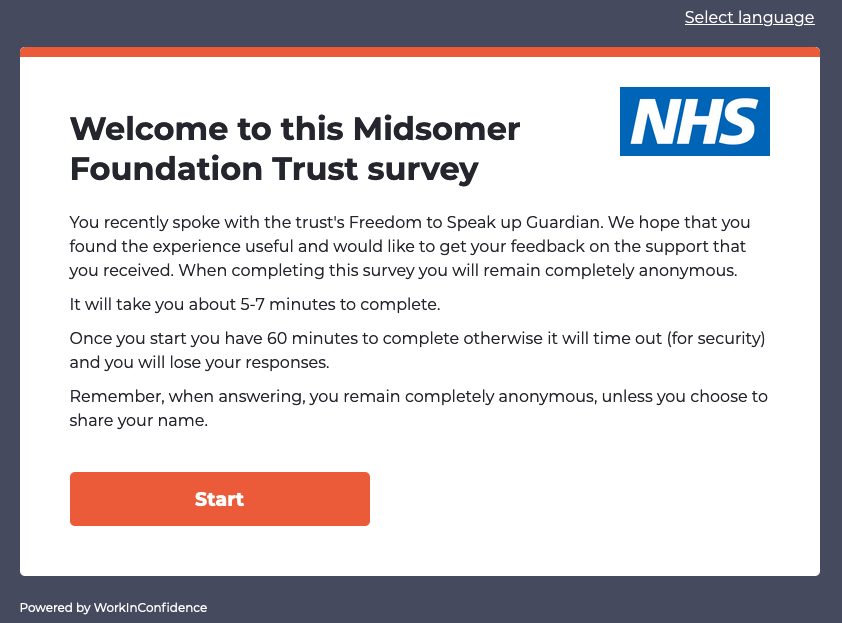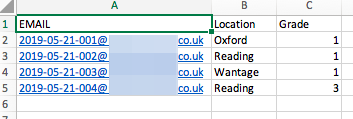Introduction
WorkInConfidence is delivered with a set of pre-built survey templates that you can use as a starting point for your own surveys. To assist our clients in the health and care sectors, we have created templates of existing surveys that are required by the sector bodies. These will help you both save time and comply.
The current templates are as follows:
- The National Quarterly Pulse Survey (NQPS) which replaced NHS Staff Friends & Family Test (FFT)
- NHS People Pulse
- Freedom to Speak Up Guardian (FSUG) Feedback
- Care Quality Commission (CQC) Survey
The rest of this article discusses these in greater detail and allows you to preview each of the surveys.
Using the templates
Once logged in to WorkInConfidence from the left-hand function menu choose Surveys > Templates and you will be taken to a page, listing all the currently available templates. You can filter the templates by categories or search by a keyword to find if we have what you are looking for.
Select the template that you want to import from the list and click the Download button. The survey will be copied into your system and you can go to Surveys > Created Surveys and it will show up at the top of the list for you to amend as you wish.
You can learn more about how to access and use WorkInConfidence survey templates in this Knowledge Base article.
The National Quarterly Pulse Survey (NQPS) [replaced NHS Staff Friends and Family Test (FFT)]
‘We Are The NHS: People Plan 2020/21 – Action For Us All’ document published by NHS England committed to supporting a new quarterly staff survey to track people’s morale and support employee listening on a regular basis. This does not replace the existing NHS Staff Survey (NSS) but compliments it and is run in quarters one, two and four ensuring that there is no clash with the NSS. Data collected must be submitted centrally via the Strategic Data Collection Service (SDCS).
All NHS provider organisations must run the Quarterly Staff Survey. There isn’t any firm guidance on how many people should be sent the survey but the implication is that every member of staff that received the NSS should be invited to respond.
The National Quarterly Pulse Survey (NQPS) has been implemented from April 2021, replacing the Staff Friends and Family Test (Staff FFT) which had previously been carried out since April 2014, and the FFT questions are incorporated into it. During Quarter 1 2021/22 only organisations which subscribe to the national pulse survey, the People Pulse, participated in the NQPS.
The National Quarterly Pulse Survey was implemented in all NHS trusts providing acute, community, ambulance, and mental health services in England.
The aim is for all staff to have the opportunity to feed back their views on their organisation every quarter. Organisations will be required to collect data in Quarter 1, 2 and 4. There is no requirement to collect National Quarterly Pulse Survey data during Quarter 3 (October), when the annual staff survey is undertaken, although organisations may choose to do so. For the remaining three quarters, during the months of April, July and January, each trust will need to ask all staff the nine engagement theme questions from the annual NHS staff survey.
Recognising that some trusts have well established in house surveys and staff engagement tools, the method of data collection for the National Quarterly Pulse Survey is flexible and can be decided by each Trust. Trusts will need to submit the data gathered through the Strategic Data Collection Service, as was the case for the Staff FFT.
The survey is made up of the engagement theme questions from the annual staff survey, these questions are focused on three dimensions of engagement: motivation, involvement, and advocacy. You can see these in the template preview below.
More details about the The National Quarterly Pulse Survey (NQPS) can be found here.
NHS People Pulse
The NHS People Pulse is an optional monthly survey that NHS providers can use to support local engagement activities. First run in early 2020 to capture sentiment during the Covid pandemic and so the current questions reflect this.
NHS providers can access the People Pulse at no charge through NHS England but WorkInConfidence have created the People Pulse as a template as you may wish to test it internally or use it as the starting point for other engagement surveys.
Freedom to Speak Up Guardian (FTSUG) feedback
The National Guardian’s Office (NGO) supports the healthcare system in England on speaking up. The NGO leads, trains, and supports an expanding network of Freedom to Speak Up (FTSU) Guardians. Freedom to Speak Up Guardians (FTSUG) support workers to speak up. They also proactively work within their organisation to tackle barriers to speaking up.
FTSU Guardians are required to record all cases of speaking up that are raised with them, however, the cases come to them e.g. through their local network, phone call, etc.
On a quarterly basis, all FTSU Guardians are required to report information to the NGO regarding the speaking-up cases brought to them and their networks of champions/ambassadors.
Speaking up is an opportunity to learn and improve, and recording the learning points for an organisation
that arise out of cases allows FTSUG to make suggestions for improvement and allows the NGO to identify wider trends and themes. As part of this, the NGO states that: “feedback should be obtained when a case is closed, even when the person speaking up may be unhappy with the outcome of their case. Each individual should be offered the opportunity to provide feedback to you, even if they spoke up to you about the same issue, together or separately.”
More details can be found in the ‘Recording Cases and Reporting Data – guidance for Freedom to Speak Up Guardians’, March 2021, as well as on the NGO website.
The WorkInConfidence includes the NGO’s required questions, as well as some suggestions for other questions that you might like to ask. As with all our templates you can add and remove and edit any questions to suit your individual organisation’s needs.

FTSUG Feedback Survey Landing Page
Care Quality Commission (CQC) Survey
We are currently investigating surveys in this area and we will update this Knowledge Base article once more details are established.
Need more help? If you'd like help or support on any feature of WorkInConfidence then please get in touch by either creating a new support ticket, sending an email to support@workinconfidence.com or using the chat function in the bottom right of the page.



